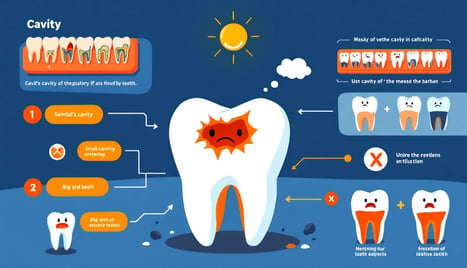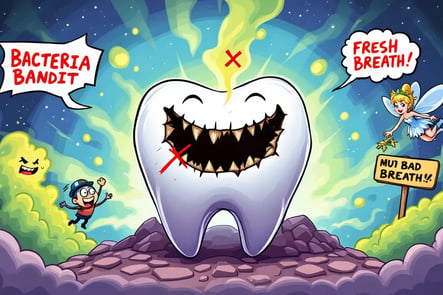Do Cavities Cause Bad Breath ?
Do cavities cause bad breath ?
How Cavities Causes Bad Breath
Points to Remember
Cavities causes bad breath mainly because of the bacteria that lives inside them and produces foul smelling compounds as they break down food particles.
Factors that contributes to bad breath from cavities are microbes build up and poor oral hygiene practices.
Remedies to combat cavities and bad breath are regular brushing and flossing, regular dental check-ups and mouthwash.
Bad breath is often associated with dental caries or cavities. These decayed areas on your teeth surfaces are created by acid produced when plaque bacteria interacts with sugars and erodes the tooth enamel. As a result these areas becomes hotspots for bad bacteria which in turn produces volatile sulfur compounds that has unpleasant odor. This bacteria activity is one of the main contributor to bad breath.
And to make it worse poor oral hygiene allows more food particles to stay in the mouth and feed the bad bacteria inside cavities. This creates a cycle where not only cavities causes bad breath but also serves as an indicator that you have one. Knowing how both are connected is the key to managing and solving them.
Factors that causes Bad Breath from Cavities
Several factors are responsible for bad breath from cavities including microbes build up, poor oral hygiene practices and dry mouth. All these factors contributes to halitosis and needs attention.
Cavities becomes a breeding ground for bacteria because they traps food particles, perfect condition for bacterial growth. As these bacteria breaks down the trapped food debris, their metabolic process releases foul smelling compounds that contributes to bad breath.
As this food breakdown continues inside cavities, it allows more bacteria to grow and produces volatile sulfur compounds — these are the main culprits of bad breath. Cavities doesn’t directly causes bad breath but it’s the bacteria inside them that’s the problem.
Dry mouth or xerostomia is another factor that contributes to bad breath from cavities. Saliva is very important in oral health by washing away food particles and bacteria. Lack of saliva production allows bacterial growth and contributes to bad breath.
Not drinking enough water makes dry mouth worse and bad breath. For those with untreated cavities dry mouth can be a persistent problem because of pain or bacteria that hinders normal saliva flow.
Drinking water promotes saliva production and reduces bad breath.
Poor oral hygiene with certain medications.
Neglecting oral care can lead to big problems like tooth decay and halitosis or bad breath. This happens because food particles and bacteria accumulates in the mouth without regular brushing and flossing and creates conditions that causes these problems. Using fluoride toothpaste and daily flossing is the key to avoid these problems.
Not paying attention to oral hygiene can lead to periodontal disease which makes bad breath worse because of swollen and infected gums. A regimen of regular brushing, flossing and regular dental check-ups is key to a healthy mouth and fresh breath.
Untreated Cavities
If cavities are not treated it can lead to serious dental problems and health issues. Cavities can cause discomfort through toothaches, infections and can even lead to tooth loss. Bacteria inside these untreated areas multiply and burrow deeper into the tooth structure causing more harm and more decay.
And cavities can also emit foul smell that makes bad breath worse – a sign of big oral health problems. Addressing these problems early on can prevent such complications and overall dental health.
Remedies to Cavities and Bad Breath
Good oral hygiene and professional dental care is key to fighting cavities and gum disease . This can be done through regular brushing, flossing, regular dental check-ups and mouthwash.
Regular Brushing and Flossing
Taking care of oral health and bad breath requires attention, regular brushing and flossing. Using fluoride toothpaste for twice daily brushing strengthens the teeth enamel and removes bacteria and food particles. Use a soft-bristled toothbrush to ensure thorough cleaning without harming the gums.
And flossing daily which removes plaque and food particles between teeth – areas that regular brushing can’t reach. These habits combined will keep your breath fresh and mouth clean.
Dental Check-Ups
Regular dental check-ups is key to dental wellness and bad breath. These appointments allows professional cleaning and early detection of cavities and gum disease and stops its progression. Overall dental hygiene depends on these regular visits.
By visiting your dentist regularly you can control current cavities and prevent new ones from forming. This proactive approach will give you fresher breath and a clean mouth.
Antibacterial mouthwash reduces bacteria that causes bad breath. Mouthwash with chlorhexidine or cetylpyridinium chloride is effective in killing bacteria and freshening breath.
Adding antibacterial mouthwash to your routine will give you fresher breath and overall oral health.
More Tips to Fresh Breath
Other ways to keep your breath fresh is to drink plenty of water, chew sugar-free gum and use a tongue scraper. These are simple but effective.
Drinking plenty of water is key to fresh breath. It moisturizes the mouth and flushes out food particles and bacteria thus reducing bad breath. Adequate hydration also helps in saliva production which neutralizes acidic substances and cleanses the mouth.
After eating use sugar-free gum to promote oral hygiene and fresh breath by increasing saliva production which neutralizes mouth acids and cleans the oral cavity. It dislodges food particles from the teeth and reduces bad breath thus overall dental health.
Using a tongue scraper regularly can remove bacteria that causes bad breath. By scraping away bacteria and debris from the tongue you can improve your overall oral hygiene.
Will Filling Cavities Help Bad Breath?
Restoring oral health and bad breath can be done by filling cavities. Fillings or root canals can remove the bacteria accumulation that causes bad smell.
Good oral hygiene after dental treatment is key to prevent Cavity formation and bad breath. Follow your dentist’s advice to have long term fresh breath and overall oral health.
Other Signs of Cavity
Knowing the early signs of an untreated cavity is key to prevent oral health problems. If you feel sensitivity in your teeth when eating hot, cold, acidic or sweet foods it may be a sign of a cavity forming. If there are visible holes on the surface of the teeth it means the cavity is already in advanced stage and needs professional dental attention.
Being aware of these signs will allow you to get treated ASAP and save your oral health.
Oral Health
Oral health is more than just brushing and flossing. A balanced diet, no tobacco and regular dental visit prevents cavities and bad breath.
Homemade mouthwash with baking soda and warm water reduces bacteria and fresh breath and oral health.
Conclusion
In summary cavities is one of the main cause of bad breath as it allows bacteria to grow due to poor oral hygiene. Taking care of cavities with regular dental maintenance and good oral hygiene will give you clean breath and overall oral health.
Now that you know how cavities relate to bad breath and the solutions and tips above will help you have a healthier mouth and fresh breath daily.
FAQs
Do cavities cause bad breath?** **?
Yes cavities causes bad breath as it allows bacteria to grow and emit bad smell. Address cavities ASAP to improve breath freshness.
How to prevent cavities and bad breath?** **?
Prevent cavities and bad breath by brushing your teeth regularly with toothpaste, floss daily, schedule regular dental visit and use antibacterial mouthwash.
Will filling cavities help my bad breath?** **?
Filling cavities will yes improve bad breath as it removes the bacteria that causes the bad smell.
Addressing dental problems is key to oral health and freshness.
What are the other signs I have a cavity?** **?
Visible holes in teeth and increased tooth sensitivity are signs that you have a cavity. If you experience these symptoms see a dentist ASAP.
How often should I visit the dentist to prevent cavities?** **?
Visit the dentist every 6 months for regular check-ups to prevent cavities.
This frequency will give you optimal oral health and early detection of dental problems .
Do Cavities Cause Bad Breath? Causes and Tips
What are Cavities?
Cavities also known as dental caries or tooth decay is when the hard surface of the teeth is damaged permanently.
This damage is caused by the accumulation of plaque, a sticky film of bacteria and the interaction of sugars in food with these bacteria.
The acid produced by this interaction can erode tooth enamel and create small holes on the tooth called cavities.
Tooth decay can lead to tooth loss and other oral problems if left untreated.
Causes of Bad Breath
Bad breath also known as halitosis is an oral problem caused by many factors including cavities, tonsil stones and poor oral hygiene.
Poor oral hygiene is one of the main factor in developing cavities which can lead to bad breath.
Dry mouth (xerostomia) can also cause bad breath as saliva helps to wash away food particles and bacteria.
Some food like garlic and onions can cause temporary bad breath.
Cavities and Bad Breath
Cavities is a breeding ground for bacteria that causes bad smell.
Bacteria inside a cavity can thrive and cause bacteria buildup and bad breath.
Cavities can trap food particles and liquid residue and causes bacteria buildup.
Untreated cavities can lead to further decay, infection and even spread to the jawbone.
Tips to Combat Cavities and Bad Breath
Brushing and Flossing
Good oral health starts with regular and thorough brushing and flossing.
Use fluoride toothpaste and soft-bristle toothbrush to brush your teeth twice a day.
Don’t forget to floss daily to remove food particles and plaque between your teeth.
Regular brushing and flossing can kill bacteria and prevent further decay to your teeth.
Visit the Dentist
Regular dental check-ups is key to detect and treat cavities early.
Your dentist will do a thorough examination, X-ray and treatment.
Dentist can prevent bad breath and good oral hygiene.
Preventing Tooth Decay
Limiting sugary food and drinks can prevent cavity formation.
Bacteria feeds on sugars and produce acid that erode tooth enamel.
Drinking water after consuming sugary or acidic food and drinks can also help.
Good oral hygiene and avoiding sugary or acidic food can also prevent cavities.
Good Oral Habits
Regular visit to your dentist can prevent cavities and other oral problems.
Good oral habits like brushing and flossing can keep your mouth healthy.
Mouthwash and rinses can reduce bacteria population in your mouth and minimize bad breath.
Stay hydrated to keep your saliva production going which helps to wash away food particles and bacteria.
Summary
Cavities is one of the main cause of bad breath.
Good oral hygiene, regular dental visit and healthy diet can prevent cavities and bad breath.
A healthy mouth is for overall health, bad breath and less risk of big problems.
Your doctor can detect and treat cavities before it becomes big problems.



